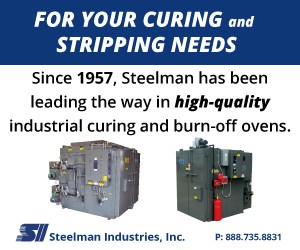Coating Methods to Avoid Rust
We manufacture basketball equipment that is used outdoors. Presently, we powder coat the equipment, but have had issues with rusting, especially in coastal and humid climates. Do you have any ideas for how to avoid the rust?
Q. We manufacture basketball equipment that is used outdoors. Presently, we powder coat the equipment, but have had issues with rusting, especially in coastal and humid climates. Do you have any ideas for how to avoid the rust? Would a different coating work better? Thank you. W.F.
A. Your problem with rust is not due to the powder coating specifically and another spray coating will not solve the problem. There are three things that should always be considered when coating a product for outdoors.
One, you must treat the substrate correctly so that is free of soil and has no corrosion before coating. Two, your coverage must be complete, no voids. Third, the coating must be thick enough and tough enough to resist the atmospheric conditions where the part is installed. You have options that will solve your problem. You do not tell me much about your process so I will make one up as an example:
You use an iron phosphate to treat the steel. You apply one coat of TGIC polyester. This is not going to provide a very long life in an outdoor application. What could you change? You could use a zinc phosphate conversion coating. That would enhance your corrosion resistance. However, it would also add a lot of expense and regulatory pressure.
You would have to replace your washer with a much bigger one. It would be harder and more expensive to operate with more headaches. You could stay with the iron phosphate and apply a primer coat in addition to the polyester. This would help a lot but you must be certain to get complete coverage in all the creases where rust will begin. This will mean running the part twice to double coat or installing a second booth and cure oven for the primer.
The primer does not need 100 percent cure before the topcoat is applied, so a small over will do. You could put on two coats of the polyester. This would not be quite as good as the primer and it is challenging to recoat a part. Still, it would be an improvement. You could have your parts primed with electrocoat paint or autophoretic coating by a contract coater or you could install an immersion coating system. These coatings will be limited in color options but it will provide excellent corrosion protection because the immersion process gets into the tight creases much better than spray coating. Probably not suitable for a stand-alone coating for your application due to color limitations and it is a very thin coating. Electrocoat or autophoretic coating and powder combined would be very, very good.
In liquid paint you would need to prime in order to get the outdoor performance. That would most likely be more expensive than other options and not as good as primer plus powder topcoat. I would focus on double-coating with powder or electrocoat plus powder.
Related Content
-
Powder Coating 4.0: Smarter, Faster, More Efficient and Connected
New tools reduce cost and waste, lower manufacturing footprint of powder coating operations.
-
Curing Oven Basics
Simply heating up the substrate does not cure the coating. There are many variables to consider when choosing the best cure oven for your application...
-
Products Finishing Reveals 2024 Qualifying Top Shops
PF reveals the qualifying shops in its annual Top Shops Benchmarking Survey — a program designed to offer shops insights into their overall performance in the industry.














.jpg;maxWidth=300;quality=90)

